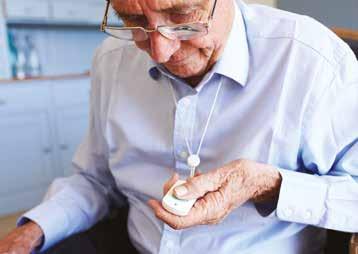
4 minute read
Services for carers
A personal health budget is an amount of money to support a person’s identified health needs. It is planned and agreed between the person and their local NHS team. The aim is to enable people with long-term conditions and disabilities to have greater choice, flexibility and control over the healthcare and support they receive.
Who is a carer?
Carers regularly look after, help or support someone who wouldn’t be able to manage everyday life without their help. A carer doesn’t have to be living with the person they care for, and the help they give doesn’t have to be physical. The carer may be caring for a partner, another relative, a friend or a neighbour. For example, it may be someone who:
• is over 60;
• is living with dementia;
• has a physical or learning disability or a mental health condition;
• has sight, hearing or communication difficulties; • has a long-term health condition; or
• misuses drugs or alcohol.
The carer may be helping with:
• personal care, such as washing and dressing;
• going to the toilet or dealing with incontinence;
• eating or taking medicines;
• getting about at home or outside;
• practical help at home and keeping someone company; or
• emotional support or communicating.
Having a carers’ assessment
Anyone who provides, or intends to provide, regular unpaid support to someone who could not manage without their support has the right to have their needs assessed, even if the person they care for has refused support services or an assessment of their own needs.
A carers’ assessment is an opportunity for people to tell the council what they need as a carer, and to find out what support might be available. The assessment is an essential first step for carers to get the support they may need. It looks at: • the care the carer provides and how this affects their life; • any support they are getting now and what else would help; and • what they would like their support to achieve. about other services that might help, and other ideas for support. A carers’ assessment will show if the carer qualifies for support from Adult Social Care.
Carers’ Personal Budgets
A carers’ Personal Budget is a single payment that can be used towards the cost of something specific that will support carers in their caring role. For example, it could be used for leisure activities, education or training, or just to take a short break from caring.
When Adult Social Care considers a carers’ Personal Budget, it gives priority to situations where there is a significant risk of the carer not being able to continue to provide care if they do not get some support. The amount a carer could get depends on their needs identified by their carers’ assessment. The money is not taxed, and it will not affect any benefits.
Home-based respite services give carers a break from their caring responsibilities. A care worker can come in to look after the person being cared for, so the carer can have some time to themselves. The breaks could be regular or just when needed.
Respite at home is considered to be a service for the person who is being cared for. If they have a Personal Budget for their own needs (see page 14) they could use that money to pay for it.
A financial assessment of the person being cared for will confirm whether they need to pay towards the cost of this service.
Benefits
Carers may want to explore whether they are entitled to Carer’s Allowance – currently £67.60 per week but this may change over the lifetime of this Directory.
Carers may also qualify for Carer’s Premium or Carer’s Credit depending on their eligibility. The Government’s website (www.gov.uk ) has more information on benefits, including carers’ benefits. Alternatively, contact a local carers’ organisation which may be able to help undertake a benefit check.
Care Companion
Enables carers of older people to set up an online profile to access information and support, details of local support groups and a journal function designed for carers to record their daily activities. Setting up a profile enables services to be personalised to each carer’s circumstances. Email: carecompanion@warwick.ac.uk Web: www.carecompanion.org.uk
Carers Trust Heart of England
Formed to improve the lives of family carers and the people they care for. The trust operates several hubs and community groups across Warwickshire to enable carers’ individual needs to be met. Use the contact details below to find support near you. Tel: 0247 663 2972 (option one). Email: contactus@carerstrusthofe.org.uk Web: www.carerstrusthofe.org.uk
Resource for those supporting disabled children
My Family, Our Needs is an online resource providing impartial information for parents, carers and practitioners supporting children from birth to 25 years with additional needs. As well as guidance, policy and signposting, there is a lifestyle section for parents covering topics such as health and wellbeing, work, family and relationships. Visit
www.myfamilyourneeds.co.uk
The lifestyle site for parents and carers of children with additional needs and those who support them.
www.myfamilyourneeds.co.uk
• Birth to adulthood • Real life blogs • Directory • Ask the experts • Monthly columnist
hello@myfamilyourneeds.co.uk @WeAreMFON Subscribe today







